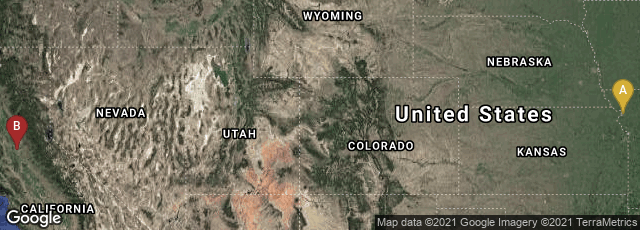Illustrated Map of Pony Express Route in 1860 by William Henry Jackson ~ Courtesy the Library of Congress ~ The Pony Express mail route, April 3, 1860 – October 24, 1861; Reproduction of Jackson's map issued by the Union Pacific Railroad Company, 1960.
"First letter received from C. A. Low by Pony Express" sent to Messrs. A. A. Low & Brother in New York. The stamp indicates that the letter traveled from San Francisco to St. Joseph, Missour by April 13. The letter was sent on prepaid Wells Fargo Stationery. Date of mailing in April seems illegible , but may be April 3.

A: Saint Joseph, Missouri, United States, B: Sacramento, California, United States
The legendary Pony Express, a fast mail service crossing the Great Plains and the Rocky Mountains from St. Joseph, Missouri, to Sacramento, California was operational only for little more than one year, from April 3, 1860 to October 26, 1861. Carrying messages by horseback riders in relays to stations across the prairies, plains, deserts and mountains of the western United States, it reduced the transit time for messages between the Atlantic and Pacific Coasts to about 10 days, with telegraphic communication covering about half the distance and couriers on horseback covering the rest.
"In 1860 there were about 157 Pony Express stations that were about 10 miles (16 km) apart along the Pony Express route. This was roughly the distance a horse could travel at a gallop before tiring. At each station stop the express rider would change to a fresh horse, taking only the mail pouch called a mochila (from the Spanish for pouch or backpack) with him. The employers stressed the importance of the pouch. They often said that, if it came to be, the horse and rider should perish before the mochila did. The mochila was thrown over the saddle and held in place by the weight of the rider sitting on it. Each corner had a cantina, or pocket. Bundles of mail were placed in these cantinas, which were padlocked for safety. The mochila could hold 20 pounds (10 kg) of mail along with the 20 pounds of material carried on the horse. Included in that 20 pounds were a water sack, a Bible, a horn for alerting the relay station master to prepare the next horse, a revolver, and a choice of a rifle or another revolver. Eventually, everything except one revolver and a water sack was removed, allowing for a total of 165 pounds (75 kg) on the horse's back. Riders, who could not weigh over 125 pounds, changed about every 75–100 miles (120–160 km), and rode day and night. In emergencies, a given rider might ride two stages back to back, over 20 hours on a quickly moving horse.
"It is unknown if riders tried crossing the Sierra Nevada in winter, but they certainly crossed central Nevada. By 1860 there was a telegraph station in Carson City, Nevada. The riders received $25 per week as pay. A comparable wage for unskilled labor at the time was about $1 per week" (Wikipedia article on Pony Express, accessed 12-24-2010).
Completion of the first transcontinental telegraph line on October 24, 1861 made the Pony Express obsolete, and it shut down two days later. Remarkably, this legendary U.S. mail service existed for only one year and seven months!